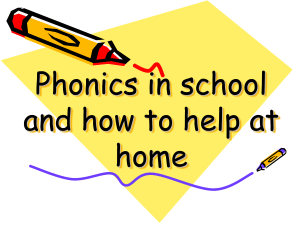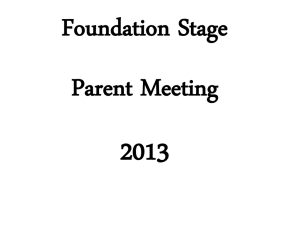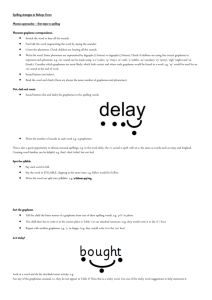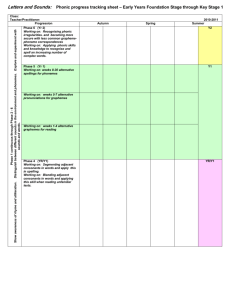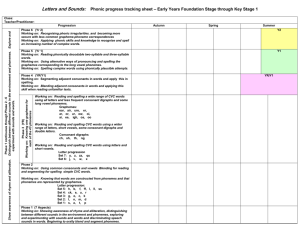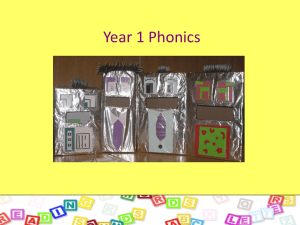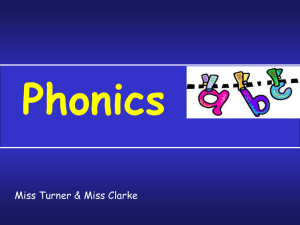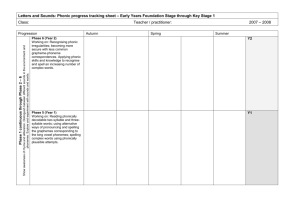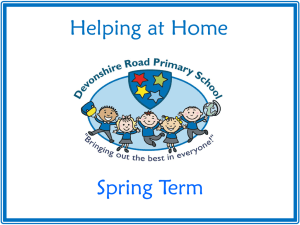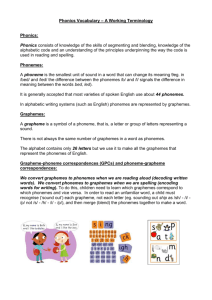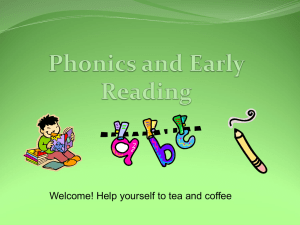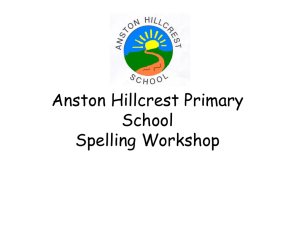ks1 curriculum evening literacy 2012
advertisement
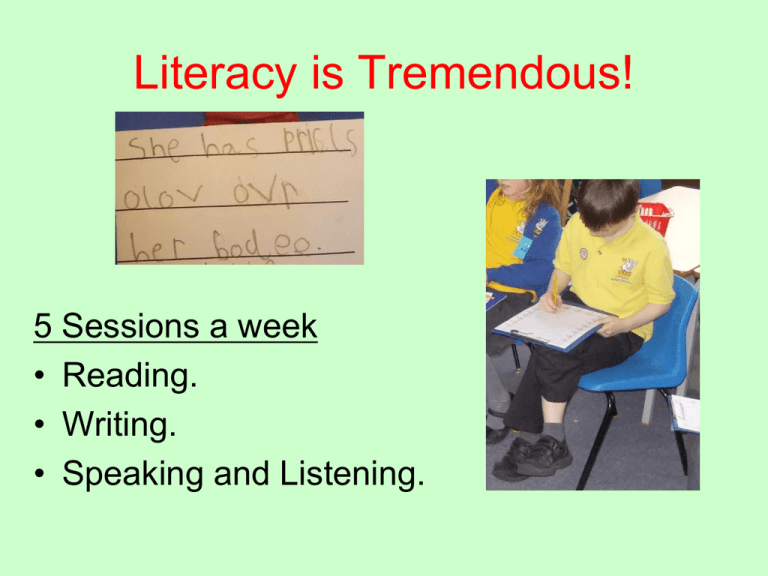
Literacy is Tremendous! 5 Sessions a week • Reading. • Writing. • Speaking and Listening. Each Literacy unit lasts 2-3 weeks and focuses on a text type, e.g. poetry, narrative or nonfiction. “Education is not filling a bucket but lighting a fire” W.B. Yeats An Enriched Curriculum! Ask them to suspend disbelief and step into a whole new world…. We don’t believe in lids… …we believe in challenge! All our Literacy sessions are taught in a challenging and open ended way so that pupils always have the opportunity to exceed expectations. What is phonics? We teach these two main skills… Term Meaning To segment To split a word into its separate sounds, as an aid to spelling. To list the sounds within a word and put together quickly to form the word. (Taught as a strategy for reading unknown words.) To blend b – oa - t Virginia Bridge / Phonics glossary / August 2000 And the knowledge of the graphemes and phonemes Term Meaning Examples Phoneme The smallest unit of sound that you can hear within a word. The word phoneme refers to the sound , NOT the letter(s) which represent the sound in writing. c/a/t = 3 phonemes th/e/n = 3 phonemes ch/air = 2 phonemes w/e/n/t = 4 phonemes Grapheme The written representation of a phoneme. c/a/t = 3 graphemes th/e/n = 3 graphemes ch/air = 2 graphemes w/e/n/t = 4 graphemes A phoneme you hear and a grapheme you see A word always has the same number of phonemes as graphemes. At a glance, phonics is…. Skills of oral and written blending and segmenting. Knowledge of the graphemes and phonemes. •And tricky words of course! E.g. the, because. •Not all of the ‘key’ words are tricky. Some are phonetic e.g. back, get. These still need to be recognised on sight as they are ‘high frequency words’. •These are the basic skills needed for reading and writing. because Sounds of English • 44 sounds or ‘phonemes’ • Pure sounds ‘mmm’ not ‘muh’. No schwaring please!! • mst instead of must. The school website has a video that demonstrates the correct articulation of all these phonemes. Jolly Phonics and Letters and Sounds Phase 1 Oral blending and segmenting: Hearing and saying sounds in words before learning to read and write them. Phase 2 Phase 3 – Digraphs (Phonemes or graphemes made up of two or more letters) Phase 4 • Initial and final consonant clusters, e.g. free or went. Phase 5 •Alternative spellings and pronounciations of previously learnt phonemes and graphemes. For example there are only 44 phonemes in the English Language but there are over 100 different ways to spell them. To make it a bit clearer for you…..! /ai/ /ee/ /ie/ pain, day, gate, station sweet, heat, thief, these tried, light, my, shine, mind /oa/ road, blow, bone, cold /oo/ moon, blue, grew, tune The length of the word doesn’t necessarily dictate it’s difficulty, e.g. children may learn to spell a word like ‘chimpanzee’ before they learn a word like ‘thief’. Phase Six • Past tense, adding suffixes, e.g. ‘ly’, ‘ful’ ‘ness’ and spelling of more complex words. Year 3 Onwards: Support for Spelling Children need the opportunity to apply their phonic knowledge independently. Encourage children to ‘split’ the syllables in polysyllabic words. Mistakes aren’t a problem, they’re a challenge! Self assessment is key! Bear this in mind when supporting children with home learning. Copying doesn’t help! As children progress through Phase 5 onwards we ask them to apply their knowledge of alternative graphemes. Try writing it different ways. Which way do you think looks right? norty nawty nauty naughty In Year 3, we continue to teach children to use the spelling patterns they are learning. E.g. we have learnt when a word has a ‘y’ on the end, the plural usually changes it to ‘ies’ so how do you think we will write the plural for army? Other spelling tips •i before e except after c •There is ‘a rat’ in separate •Mix up desert and dessert? With dessert you like seconds so there is a second ‘s’! •Wednesday (say the ‘nes’!) •Acronyms! B- Big, E- elephants, C-can’t, A – always, U-use, Ssmall, E-exits = BECAUSE! Captain Connective links longer sentences together! Sergeant Sabotage is out to spoil your sentence! The Incredible Opener starts every sentence with some oomph! VCOP and Big Write Doctor Punctuation makes sure every sentence packs a punch! Violet Vocabulary has a wow word for every occasion. Progression Activity! WALT: understand the importance of developing vocabulary. • Listen to the audio clip from ‘The Twits’. Write down any ‘wow words’ (any appropriate descriptive language, e.g. adjectives, adverbs, technical vocabulary, etc) that you hear. http://www.youtube.com/watch?v=5YHaWzGBVEc&feature=relmfu WILF: Must: Write down any wow words you hear. Should: Think about why they are appropriate wow words. Could: Write down any connectives or openers you hear too! Talk for Writing Getting children to verbalise and discuss what they want to write before they write, makes a huge difference. If they can’t say it, they can’t write it! Peer/Self Assessment 2b 2b • Punctuation more accurate. • Less phonetic • Words used more for effect. 1b • Beginning to use paragraphs. • Speech marks. • More sophisticate vocabulary. • Spelling largely accurate. • Use of a range of connectives and openers. A more detailed break down of the levels for reading and writing as well as your child’s individual level and target will be shared at parent’s evening. Guided Reading An opportunity to…. • Assess the children. • Develop their technical reading skills. • Develop their comprehension skills. See the school website (on handout) for an example of this. Reading Tips • Sound buttons, e.g coat • Split digraphs (e.g. bike, rode) • The phonics screening test and the importance of nonsense words • Use the ‘pause, prompt, praise’ flowchart to develop independent reading skills • Use comprehension questions to develop your child’s contextual understanding of a text • Join the library! Handwriting Let’s hear it for the boys! The gender gap is narrowing but there is still a lot to do…. • Outdoor writing – clipboards are great! Write a football commentary! • Comics. • ICT! (see handout for websites). • Toy Story pens and pencils. • Treasure hunts! • Shopping lists, letters, posters, labels – children love writing for a purpose! • Silly sentences. • Kung Fu Punctuation. • Calling all Dads, uncles, big brothers etc! Your school needs you!
